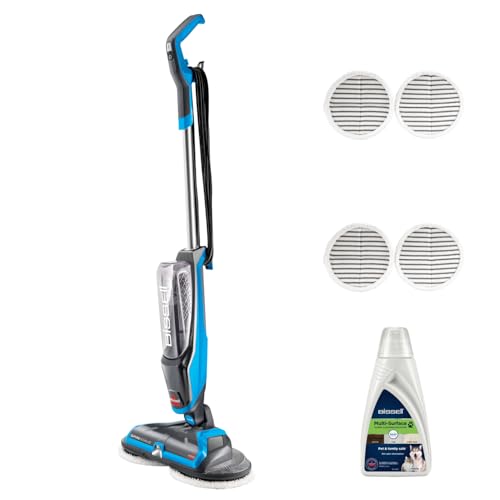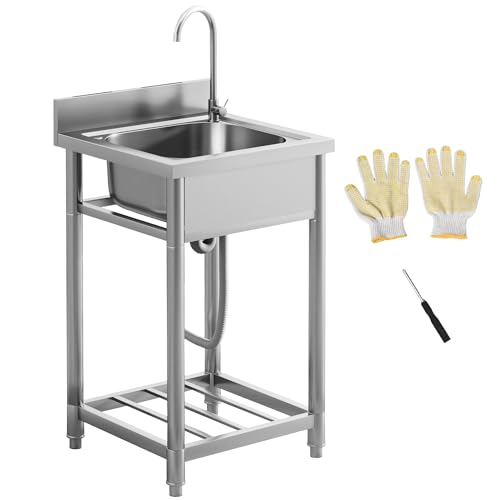




When it comes to doing laundry, many of us simply follow the temperature recommendations on the care labels of our clothes. However, have you ever wondered if there’s an optimal temperature for washing clothes? Is it possible to wash clothes in cold water without compromising cleanliness? In this article, we will explore the ideal temperature range for washing clothes and discuss the impact of different temperature settings on the cleanliness and longevity of your garments.
Traditionally, hot water has been associated with effective cleaning, as it helps to kill bacteria and remove stains more easily. However, advancements in laundry detergents and washing machines have made it possible to achieve the same level of cleanliness with lower water temperatures. In fact, washing clothes in cold water has its advantages, both environmentally and economically. Cold water washing can save energy and reduce your utility bills, while also preventing colors from fading and fibers from shrinking.
While cold water washing is generally safe for most fabrics, there are some exceptions. For heavily soiled items or those with oily stains, warmer temperatures may be necessary to break down and remove the dirt effectively. Additionally, some delicate fabrics may require gentle washing at low temperatures to avoid damage. It’s important to read the care labels of your clothes and follow the recommended temperature guidelines to ensure the best results.
Is There Such Thing as Cold Enough Temperature for Washing Clothes?
When it comes to doing laundry, most people are accustomed to using warm or hot water to ensure that their clothes are clean and sanitized. However, there is a growing trend towards using cold water for washing clothes. But is there such thing as a cold enough temperature for washing clothes?
Many modern washing machines now have a setting specifically for cold water wash, which uses water at a temperature of around 20°C (68°F). This temperature is considered cold enough for most laundry detergents to effectively remove stains and dirt from clothes.
In fact, washing clothes in cold water has several benefits. First and foremost, it helps to save energy, as heating water accounts for a significant portion of the energy used during laundry. By using cold water, you can reduce your energy consumption and lower your utility bills.
Additionally, washing clothes in cold water can help to preserve the colors and fabric of your clothing. Hot water can cause colors to fade and shrink certain fabrics, whereas cold water is gentler and less likely to cause damage.
It’s worth noting that not all types of stains and dirt can be effectively removed with cold water alone. For heavily soiled items or stains that require extra cleaning power, it may be necessary to use warm or hot water. However, for everyday laundry, cold water should be sufficient in most cases.
If you’re unsure about whether to use cold water or not, check the care label on your clothing. The label will typically provide instructions on the recommended water temperature for washing.
In conclusion, there is such thing as a cold enough temperature for washing clothes. Washing in cold water is not only effective at removing stains and dirt, but it also helps to save energy and preserve the quality of your clothing. Give it a try and see if it works for you!
Why the Right Temperature Matters
Preserving the Quality of Your Clothes
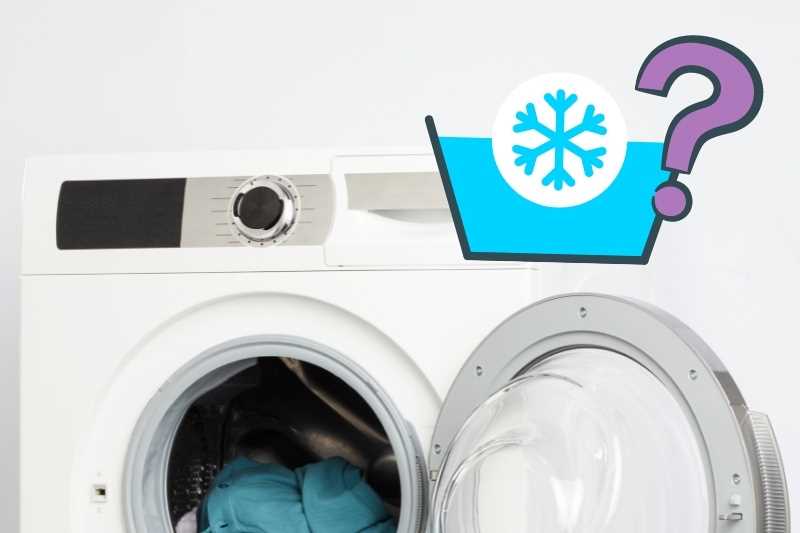
Choosing the correct temperature for washing your clothes is essential for preserving their quality and keeping them in pristine condition for as long as possible. Different fabrics and materials have different requirements when it comes to water temperature, and using the wrong temperature can lead to damage, fading, or shrinking.
Killing Bacteria and Allergens
Washing your clothes at the right temperature also helps to ensure that they are thoroughly cleaned and free from bacteria and allergens. Hot water is more effective at killing bacteria and dust mites, which is especially important for people with allergies or sensitivities. However, using water that is too hot can also damage certain fabrics or cause colors to bleed.
Saving Energy and Money
Using the right temperature for your laundry can also help you save energy and money. Washing clothes in cold water is generally more energy-efficient as it eliminates the need to heat the water. This can result in significant cost savings on your energy bills. Additionally, washing clothes in cold water can also help preserve the lifespan of your clothes, reducing the need for frequent replacements.
Choosing the Right Temperature
When it comes to choosing the right temperature for washing clothes, it’s important to follow the care instructions on the garment labels. These instructions often indicate whether to use cold water, warm water, or hot water. In general, cold water is suitable for delicate items, dark or brightly colored clothes, and items that are prone to shrinking. Warm water is generally best for moderately soiled items and everyday clothing. Hot water should be reserved for heavily soiled items like bedding, towels, and underwear.
Conclusion

Ensuring that you use the correct temperature for washing your clothes is crucial for preserving their quality, getting them thoroughly cleaned, and saving energy. By following the care instructions on garment labels and choosing the right temperature for each load, you can maintain the longevity and appearance of your clothes while also minimizing your environmental impact and energy costs.
The Impact of Cold Water on Stain Removal
Cold water washing is a popular option for those who want to save money on energy bills and reduce their environmental impact. However, many people wonder if using cold water can effectively remove stains from their clothes. In this section, we will explore the impact of cold water on stain removal and provide some helpful tips.
How Cold Water Affects Stain Removal
Contrary to popular belief, cold water can be effective for removing stains from clothes. While hot water is known to help dissolve and break down stains more easily, cold water can still do the job if used correctly.
Most stains are made up of different particles and compounds that have varying solubilities at different temperatures. In some cases, hot water may actually set the stain or make it more difficult to remove. Cold water, on the other hand, can prevent the stain from setting and make it easier to remove.
Tips for Using Cold Water for Stain Removal
Here are some tips to get the best results when using cold water for stain removal:
- Act quickly: It is important to address stains as soon as possible, regardless of the water temperature you plan to use. The longer a stain sits untreated, the more difficult it can be to remove.
- Pre-treat the stain: Before washing, pre-treat stains with an appropriate stain remover or a combination of water and detergent. Gently rub the stain to help loosen it before placing it in the washing machine.
- Use a good detergent: Opt for a high-quality detergent that is designed to work well in cold water. Look for detergents that specifically mention cold water or stain removal on the label.
- Adjust the wash cycle: If your washing machine has different wash cycle options, choose a cycle that is longer or more intensive to ensure proper stain removal.
- Check the garment label: Some fabrics may require specific care instructions, including a certain water temperature. Always check the garment label before washing.
The Bottom Line
Cold water washing can be an effective method for removing stains from clothes if done properly. Acting quickly, pre-treating stains, using a good detergent, adjusting the wash cycle, and checking the garment label are all important steps to ensure successful stain removal. By using these tips, you can confidently wash your clothes in cold water and still achieve clean and stain-free results.
What Temperature Range is Considered Optimal?
When it comes to washing clothes, the optimal temperature range depends on various factors, such as the fabric type, level of dirt, and personal preference. Here are some general guidelines:
- Cold Water (20°C or below): Cold water is ideal for delicate fabrics, such as silk, wool, and lace. It helps to prevent shrinking, color fading, and damage to the fabric. Cold water also reduces the energy consumption of the washing machine.
- Cool Water (20-30°C): Cool water is suitable for synthetic fabrics, including polyester, nylon, and acrylic. It helps to remove light stains and dirt without causing damage to the fabric. Cool water is also gentle on colors and prevents them from bleeding.
- Warm Water (30-40°C): Warm water is effective for removing normal stains and dirt from most fabrics, including cotton and linen. It provides a balance between cleaning power and fabric protection. However, it may cause some shrinkage and color fading.
- Hot Water (above 40°C): Hot water is suitable for heavily soiled clothes, white fabrics, and germ-killing purposes. It helps to remove tough stains, kill bacteria, and eliminate allergens. However, hot water can cause damage to delicate fabrics and contribute to color fading.
It’s important to read the care labels and instructions provided by the clothing manufacturer to determine the proper temperature for washing specific garments. Some fabrics may require cold water only, while others may tolerate warm or hot water. Additionally, using a high-quality detergent and following the recommended dosage will ensure effective cleaning at lower temperatures.
Remember that higher water temperatures generally result in increased energy consumption, so using colder water whenever possible can be both environmentally friendly and cost-effective.
Benefits of Washing Clothes in Cold Water
Washing clothes in cold water has several advantages. It not only saves energy but also provides other benefits that you may not be aware of.
1. Energy Efficiency
When you wash your clothes in cold water, you save a significant amount of energy that is typically used to heat the water. The water heater consumes a considerable amount of electricity or gas, so by using cold water, you can reduce your energy usage and save money on your utility bills.
2. Preservation of Colors
Washing clothes in cold water helps to preserve the colors of your garments. Hot water can cause colors to fade or bleed, especially with delicate or brightly colored clothes. By using cold water, you can keep your clothes looking vibrant and new for a longer period of time.
3. Maintaining Fabric Quality
Hot water can be harsh on fabrics and may cause shrinkage or damage. Cold water, on the other hand, is gentle and helps to maintain the quality of your clothes. It is especially beneficial for delicate fabrics such as silk or wool.
4. Environmental Impact
Using cold water for washing clothes has a positive impact on the environment. By reducing the energy consumption associated with hot water, you can decrease your carbon footprint and help to conserve natural resources.
5. Versatility
Washing clothes in cold water allows you to wash a variety of garments together without worrying about color bleeding or fabric damage. This versatility can save you time and make your laundry routine more convenient.
6. Stain Removal
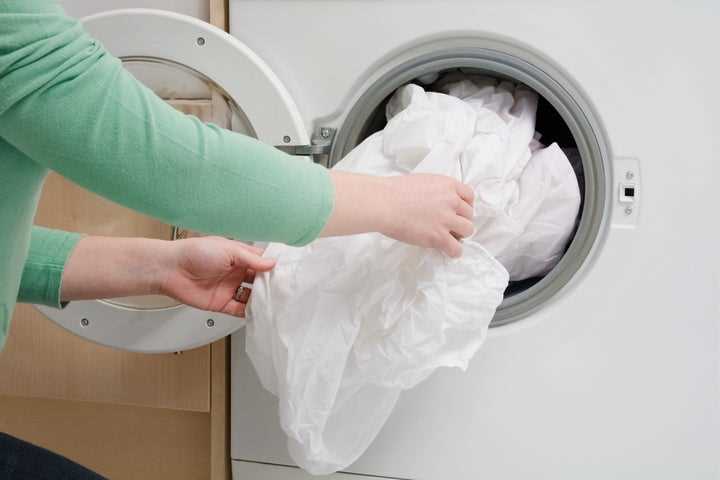
Cold water can effectively remove many types of stains, especially those that are protein-based like blood or sweat. It is recommended to pre-treat the stains before washing, and then using cold water can help lift the stains without setting them in.
Overall, washing clothes in cold water offers numerous benefits, from energy savings to maintaining fabric quality and preserving colors. Consider adjusting your washing machine settings to cold water to enjoy these advantages.
How to Achieve Effective Cleaning with Cold Water
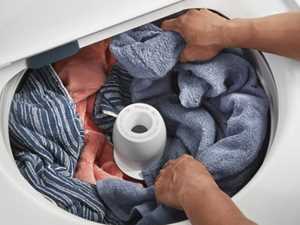
Washing clothes with cold water has several benefits, including energy savings and increased fabric lifespan. However, achieving effective cleaning with cold water requires some adjustments to your laundry routine. Here are some tips to help you get the best results:
1. Pre-treat stains
Before throwing your clothes in the washing machine, make sure to pre-treat any stains. Use a stain remover or a bit of laundry detergent directly on the stain and let it sit for a few minutes. This will help break down the stain, making it easier to remove during the wash cycle.
2. Use a high-quality detergent
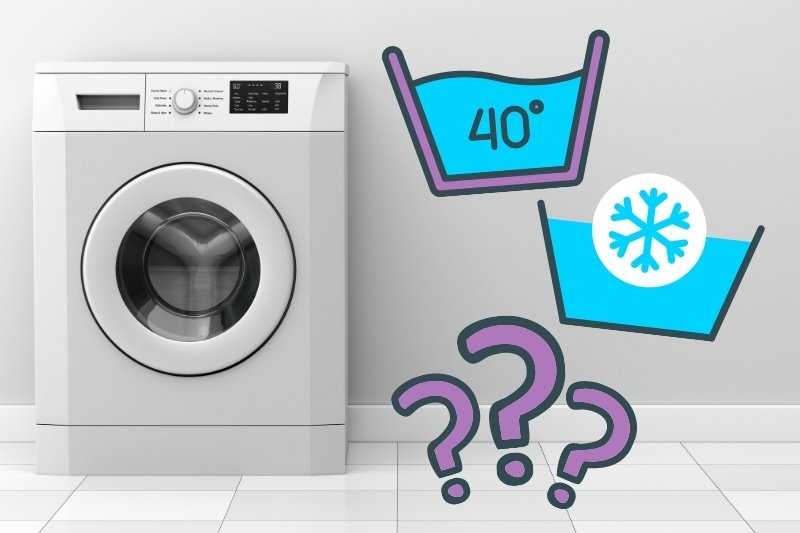
When washing with cold water, it’s crucial to use a high-quality detergent that is specifically formulated for cold water washing. These detergents are designed to work effectively at lower temperatures and can help remove dirt and stains without the need for hot water.
3. Sort your laundry
Sorting your laundry based on fabric type and color is essential for achieving effective cleaning with cold water. Separate dark and light-colored garments to avoid color bleeding. Additionally, washing delicate fabrics separately from heavier fabrics will prevent damage and maintain the integrity of your clothes.
4. Select the appropriate cycle

Most washing machines provide various cycle options. Choose a cycle that is suitable for your clothes and their level of dirtiness. For heavily soiled items, opt for a longer and more intensive cycle, while lightly soiled items may require a shorter and gentler cycle.
5. Use the right amount of detergent
Using too much detergent can leave residue on your clothes, while using too little may result in inadequate cleaning. Read the instructions on the detergent packaging and measure the appropriate amount for your load size. It’s better to err on the side of caution and use slightly less detergent than recommended, as excess detergent can be difficult to rinse out in cold water.
6. Avoid overcrowding the machine
Give your clothes enough space to move freely in the washing machine. Overcrowding the machine can prevent proper agi308202372tation, which is necessary for effective cleaning. If there is not enough space for your laundry, consider splitting it into smaller loads to ensure thorough cleaning.
7. Add a laundry booster if necessary
In some cases, adding a laundry booster can enhance the cleaning power of cold water. Oxygen bleach or enzyme-based boosters can help break down tough stains and remove odors. However, always follow the manufacturer’s instructions and avoid overusing these additives, as they may cause damage to your clothes if not used properly.
By following these tips, you can achieve effective cleaning results with cold water, saving energy and extending the life of your clothes. Remember to consult the care instructions on your garments to ensure they are suitable for cold water washing.
FAQ
What is the optimal temperature for washing clothes in cold weather?
The optimal temperature for washing clothes in cold weather is between 30-40 degrees Celsius. This temperature range ensures that your clothes get clean without any damage or shrinking.
Is it safe to wash delicate clothes in cold water?
Yes, it is safe to wash delicate clothes in cold water. Cold water is gentler on fabrics and helps prevent color fading and shrinking. However, make sure to use a gentle detergent and follow the care instructions on the garment.
Can I wash heavily soiled clothes in cold water?
It is not recommended to wash heavily soiled clothes in cold water. Cold water is less effective at removing stains and dirt. For heavily soiled items, it is best to use warm or hot water to ensure proper cleaning.
Will washing clothes in cold water kill bacteria and germs?
No, washing clothes in cold water will not kill bacteria and germs. To effectively kill bacteria and germs, you need to use hot water (at least 60 degrees Celsius) and a disinfectant laundry detergent.
Can washing clothes in cold water save energy?
Yes, washing clothes in cold water can save energy. Heating water for laundry can consume a significant amount of energy, so using cold water can help reduce your energy consumption and lower your utility bills.
What is the optimal temperature for washing clothes?
The optimal temperature for washing clothes depends on the fabric type and the level of dirtiness. Generally, a temperature of around 30°C to 40°C is suitable for most clothes.
Is it better to wash clothes in hot water?
Washing clothes in hot water can be effective for removing tough stains and killing bacteria. However, it is not necessary for every wash, as it can cause damage to certain fabric types or shrinkage.






